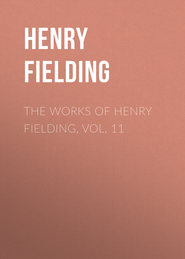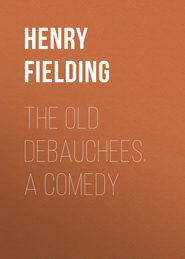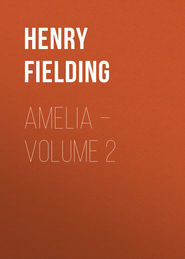По всем вопросам обращайтесь на: info@litportal.ru
(©) 2003-2024.
✖
Amelia – Complete
Настройки чтения
Размер шрифта
Высота строк
Поля
While Booth remained in a doubtful state what conduct to pursue Bound came to make him a visit, and informed him that he had been at Trent’s house, but found him not at home, adding that he would pay him a second visit that very day, and would not rest till he found him.
Booth was ashamed to confess his wavering resolution in an affair in which he had been so troublesome to his friend; he therefore dressed himself immediately, and together they both went to wait on the little great man, to whom Booth now hoped to pay his court in the most effectual manner.
Bound had been longer acquainted with the modern methods of business than Booth; he advised his friend, therefore, to begin with tipping (as it is called) the great man’s servant. He did so, and by that means got speedy access to the master.
The great man received the money, not as a gudgeon doth a bait, but as a pike receives a poor gudgeon into his maw. To say the truth, such fellows as these may well be likened to that voracious fish, who fattens himself by devouring all the little inhabitants of the river. As soon as the great man had pocketed the cash, he shook Booth by the hand, and told him he would be sure to slip no opportunity of serving him, and would send him word as soon as any offered.
Here I shall stop one moment, and so, perhaps, will my good-natured reader; for surely it must be a hard heart which is not affected with reflecting on the manner in which this poor little sum was raised, and on the manner in which it was bestowed. A worthy family, the wife and children of a man who had lost his blood abroad in the service of his country, parting with their little all, and exposed to cold and hunger, to pamper such a fellow as this!
And if any such reader as I mention should happen to be in reality a great man, and in power, perhaps the horrour of this picture may induce him to put a final end to this abominable practice of touching, as it is called; by which, indeed, a set of leeches are permitted to suck the blood of the brave and the indigent, of the widow and the orphan.
Booth now returned home, where he found his wife with Mrs. James. Amelia had, before the arrival of her husband, absolutely refused Mrs. James’s invitation to dinner the next day; but when Booth came in the lady renewed her application, and that in so pressing a manner, that Booth seconded her; for, though he had enough of jealousy in his temper, yet such was his friendship to the colonel, and such his gratitude to the obligations which he had received from him, that his own unwillingness to believe anything of him, co-operating with Amelia’s endeavours to put everything in the fairest light, had brought him to acquit his friend of any ill design. To this, perhaps, the late affair concerning my lord had moreover contributed; for it seems to me that the same passion cannot much energize on two different objects at one and the same time: an observation which, I believe, will hold as true with regard to the cruel passions of jealousy and anger as to the gentle passion of love, in which one great and mighty object is sure to engage the whole passion.
When Booth grew importunate, Amelia answered, “My dear, I should not refuse you whatever was in my power; but this is absolutely out of my power; for since I must declare the truth, I cannot dress myself.”
“Why so?” said Mrs. James.” I am sure you are in good health.”
“Is there no other impediment to dressing but want of health, madam?” answered Amelia.
“Upon my word, none that I know of,” replied Mrs. James.
“What do you think of want of cloathes, madam?” said Amelia.
“Ridiculous!” cries Mrs. James. “What need have you to dress yourself out? You will see nobody but our own family, and I promise you I don’t expect it. A plain night-gown will do very well.”
“But if I must be plain with you, madam,” said Amelia, “I have no other cloathes but what I have now on my back. I have not even a clean shift in the world; for you must know, my dear,” said she to Booth, “that little Betty is walked off this morning, and hath carried all my linen with her.”
“How, my dear?” cries Booth; “little Betty robbed you?”
“It is even so,” answered Amelia. Indeed, she spoke truth; for little Betty, having perceived the evening before that her mistress was moving her goods, was willing to lend all the assistance in her power, and had accordingly moved off early that morning, taking with her whatever she could lay her hands on.
Booth expressed himself with some passion on the occasion, and swore he would make an example of the girl. “If the little slut be above ground,” cried he, “I will find her out, and bring her to justice.”
“I am really sorry for this accident,” said Mrs. James, “and (though I know not how to mention it) I beg you’ll give me leave to offer you any linen of mine till you can make new of your own.”
Amelia thanked Mrs. James, but declined the favour, saying, she should do well enough at home; and that, as she had no servant now to take care of her children, she could not, nor would not, leave them on any account.
“Then bring master and miss with you,” said Mrs. James. “You shall positively dine with us tomorrow.”
“I beg, madam, you will mention it no more,” said Amelia; “for, besides the substantial reasons I have already given, I have some things on my mind at present which make me unfit for company; and I am resolved nothing shall prevail on me to stir from home.” Mrs. James had carried her invitation already to the very utmost limits of good breeding, if not beyond them. She desisted therefore from going any further, and, after some short stay longer, took her leave, with many expressions of concern, which, however, great as it was, left her heart and her mouth together before she was out of the house.
Booth now declared that he would go in pursuit of little Betty, against whom he vowed so much vengeance, that Amelia endeavoured to moderate his anger by representing to him the girl’s youth, and that this was the first fault she had ever been guilty of. “Indeed,” says she, “I should be very glad to have my things again, and I would have the girl too punished in some degree, which might possibly be for her own good; but I tremble to think of taking away her life;” for Booth in his rage had sworn he would hang her.
“I know the tenderness of your heart, my dear,” said Booth, “and I love you for it; but I must beg leave to dissent from your opinion. I do not think the girl in any light an object of mercy. She is not only guilty of dishonesty but of cruelty; for she must know our situation and the very little we had left. She is besides guilty of ingratitude to you, who have treated her with so much kindness, that you have rather acted the part of a mother than of a mistress. And, so far from thinking her youth an excuse, I think it rather an aggravation. It is true, indeed, there are faults which the youth of the party very strongly recommends to our pardon. Such are all those which proceed from carelessness and want of thought; but crimes of this black dye, which are committed with deliberation, and imply a bad mind, deserve a more severe punishment in a young person than in one of riper years; for what must the mind be in old age which hath acquired such a degree of perfection in villany so very early? Such persons as these it is really a charity to the public to put out of the society; and, indeed, a religious man would put them out of the world for the sake of themselves; for whoever understands anything of human nature must know that such people, the longer they live, the more they will accumulate vice and wickedness.”
“Well, my dear,” cries Amelia, “I cannot argue with you on these subjects. I shall always submit to your superior judgment, and I know you too well to think that you will ever do anything cruel.”
Booth then left Amelia to take care of her children, and went in pursuit of the thief.
Chapter vi. – A scene of the tragic kind
He had not been long gone before a thundering knock was heard at the door of the house where Amelia lodged, and presently after a figure all pale, ghastly, and almost breathless, rushed into the room where she then was with her children.
This figure Amelia soon recognised to be Mrs. Atkinson, though indeed she was so disguised that at her first entrance Amelia scarce knew her. Her eyes were sunk in her head, her hair dishevelled, and not only her dress but every feature in her face was in the utmost disorder.
Amelia was greatly shocked at this sight, and the little girl was much frightened; as for the boy, he immediately knew her, and, running to Amelia, he cried, “La! mamma, what is the matter with poor Mrs. Atkinson?”
As soon as Mrs. Atkinson recovered her breath she cried out, “O, Mrs. Booth! I am the most miserable of women – I have lost the best of husbands.”
Amelia, looking at her with all the tenderness imaginable, forgetting, I believe, that there had ever been any quarrel between them, said – “Good Heavens, madam, what’s the matter?”
“O, Mrs. Booth!” answered she, “I fear I have lost my husband: the doctor says there is but little hope of his life. O, madam! however I have been in the wrong, I am sure you will forgive me and pity me. I am sure I am severely punished; for to that cursed affair I owe all my misery.”
“Indeed, madam,” cries Amelia, “I am extremely concerned for your misfortune. But pray tell me, hath anything happened to the serjeant?”
“O, madam!” cries she, “I have the greatest reason to fear I shall lose him. The doctor hath almost given him over – he says he hath scarce any hopes. O, madam! that evening that the fatal quarrel happened between us my dear captain took it so to heart that he sat up all night and drank a whole bottle of brandy. Indeed, he said he wished to kill himself; for nothing could have hurt him so much in the world, he said, as to have any quarrel between you and me. His concern, and what he drank together, threw him into a high fever. So that, when I came home from my lord’s – (for indeed, madam, I have been, and set all to rights – your reputation is now in no danger) – when I came home, I say, I found the poor man in a raving delirious fit, and in that he hath continued ever since till about an hour ago, when he came perfectly to his senses; but now he says he is sure he shall die, and begs for Heaven’s sake to see you first. Would you, madam, would you have the goodness to grant my poor captain’s desire? consider he is a dying man, and neither he nor I shall ever ask you a second favour. He says he hath something to say to you that he can mention to no other person, and that he cannot die in peace unless he sees you.”
“Upon my word, madam,” cries Amelia, “I am extremely concerned at what you tell me. I knew the poor serjeant from his infancy, and always had an affection for him, as I think him to be one of the best-natured and honestest creatures upon earth. I am sure if I could do him any service – but of what use can my going be?”
“Of the highest in the world,” answered Mrs. Atkinson. “If you knew how earnestly he entreated it, how his poor breaking heart begged to see you, you would not refuse.”
“Nay, I do not absolutely refuse,” cries Amelia. “Something to say to me of consequence, and that he could not die in peace unless he said it! did he say that, Mrs. Atkinson?”
“Upon my honour he did,” answered she, “and much more than I have related.”
“Well, I will go with you,” cries Amelia. “I cannot guess what this should be; but I will go.”
Mrs. Atkinson then poured out a thousand blessings and thanksgivings; and, taking hold of Amelia’s hand, and eagerly kissing it, cried out, “How could that fury passion drive me to quarrel with such a creature?”
Amelia told her she had forgiven and forgot it; and then, calling up the mistress of the house, and committing to her the care of the children, she cloaked herself up as well as she could and set out with Mrs. Atkinson.
When they arrived at the house, Mrs. Atkinson said she would go first and give the captain some notice; for that, if Amelia entered the room unexpectedly, the surprize might have an ill effect. She left therefore Amelia in the parlour, and proceeded directly upstairs.
Poor Atkinson, weak and bad as was his condition, no sooner heard that Amelia was come than he discovered great joy in his countenance, and presently afterwards she was introduced to him.
Atkinson exerted his utmost strength to thank her for this goodness to a dying man (for so he called himself). He said he should not have presumed to give her this trouble, had he not had something which he thought of consequence to say to her, and which he could not mention to any other person. He then desired his wife to give him a little box, of which he always kept the key himself, and afterwards begged her to leave the room for a few minutes; at which neither she nor Amelia expressed any dissatisfaction.
When he was alone with Amelia, he spoke as follows: “This, madam, is the last time my eyes will ever behold what – do pardon me, madam, I will never offend you more.” Here he sunk down in his bed, and the tears gushed from his eyes.
“Why should you fear to offend me, Joe?” said Amelia. “I am sure you never did anything willingly to offend me.”
“No, madam,” answered he, “I would die a thousand times before I would have ventured it in the smallest matter. But – I cannot speak – and yet I must. You cannot pardon me, and yet, perhaps, as I am a dying man, and never shall see you more – indeed, if I was to live after this discovery, I should never dare to look you in the face again; and yet, madam, to think I shall never see you more is worse than ten thousand deaths.”
“Indeed, Mr. Atkinson,” cries Amelia, blushing, and looking down on the floor, “I must not hear you talk in this manner. If you have anything to say, tell it me, and do not be afraid of my anger; for I think I may promise to forgive whatever it was possible you should do.”
“Here then, madam,” said he, “is your picture; I stole it when I was eighteen years of age, and have kept it ever since. It is set in gold, with three little diamonds; and yet I can truly say it was not the gold nor the diamonds which I stole – it was the face, which, if I had been the emperor of the world – ”
“I must not hear any more of this,” said she. “Comfort yourself, Joe, and think no more of this matter. Be assured, I freely and heartily forgive you – But pray compose yourself; come, let me call in your wife.”
Booth was ashamed to confess his wavering resolution in an affair in which he had been so troublesome to his friend; he therefore dressed himself immediately, and together they both went to wait on the little great man, to whom Booth now hoped to pay his court in the most effectual manner.
Bound had been longer acquainted with the modern methods of business than Booth; he advised his friend, therefore, to begin with tipping (as it is called) the great man’s servant. He did so, and by that means got speedy access to the master.
The great man received the money, not as a gudgeon doth a bait, but as a pike receives a poor gudgeon into his maw. To say the truth, such fellows as these may well be likened to that voracious fish, who fattens himself by devouring all the little inhabitants of the river. As soon as the great man had pocketed the cash, he shook Booth by the hand, and told him he would be sure to slip no opportunity of serving him, and would send him word as soon as any offered.
Here I shall stop one moment, and so, perhaps, will my good-natured reader; for surely it must be a hard heart which is not affected with reflecting on the manner in which this poor little sum was raised, and on the manner in which it was bestowed. A worthy family, the wife and children of a man who had lost his blood abroad in the service of his country, parting with their little all, and exposed to cold and hunger, to pamper such a fellow as this!
And if any such reader as I mention should happen to be in reality a great man, and in power, perhaps the horrour of this picture may induce him to put a final end to this abominable practice of touching, as it is called; by which, indeed, a set of leeches are permitted to suck the blood of the brave and the indigent, of the widow and the orphan.
Booth now returned home, where he found his wife with Mrs. James. Amelia had, before the arrival of her husband, absolutely refused Mrs. James’s invitation to dinner the next day; but when Booth came in the lady renewed her application, and that in so pressing a manner, that Booth seconded her; for, though he had enough of jealousy in his temper, yet such was his friendship to the colonel, and such his gratitude to the obligations which he had received from him, that his own unwillingness to believe anything of him, co-operating with Amelia’s endeavours to put everything in the fairest light, had brought him to acquit his friend of any ill design. To this, perhaps, the late affair concerning my lord had moreover contributed; for it seems to me that the same passion cannot much energize on two different objects at one and the same time: an observation which, I believe, will hold as true with regard to the cruel passions of jealousy and anger as to the gentle passion of love, in which one great and mighty object is sure to engage the whole passion.
When Booth grew importunate, Amelia answered, “My dear, I should not refuse you whatever was in my power; but this is absolutely out of my power; for since I must declare the truth, I cannot dress myself.”
“Why so?” said Mrs. James.” I am sure you are in good health.”
“Is there no other impediment to dressing but want of health, madam?” answered Amelia.
“Upon my word, none that I know of,” replied Mrs. James.
“What do you think of want of cloathes, madam?” said Amelia.
“Ridiculous!” cries Mrs. James. “What need have you to dress yourself out? You will see nobody but our own family, and I promise you I don’t expect it. A plain night-gown will do very well.”
“But if I must be plain with you, madam,” said Amelia, “I have no other cloathes but what I have now on my back. I have not even a clean shift in the world; for you must know, my dear,” said she to Booth, “that little Betty is walked off this morning, and hath carried all my linen with her.”
“How, my dear?” cries Booth; “little Betty robbed you?”
“It is even so,” answered Amelia. Indeed, she spoke truth; for little Betty, having perceived the evening before that her mistress was moving her goods, was willing to lend all the assistance in her power, and had accordingly moved off early that morning, taking with her whatever she could lay her hands on.
Booth expressed himself with some passion on the occasion, and swore he would make an example of the girl. “If the little slut be above ground,” cried he, “I will find her out, and bring her to justice.”
“I am really sorry for this accident,” said Mrs. James, “and (though I know not how to mention it) I beg you’ll give me leave to offer you any linen of mine till you can make new of your own.”
Amelia thanked Mrs. James, but declined the favour, saying, she should do well enough at home; and that, as she had no servant now to take care of her children, she could not, nor would not, leave them on any account.
“Then bring master and miss with you,” said Mrs. James. “You shall positively dine with us tomorrow.”
“I beg, madam, you will mention it no more,” said Amelia; “for, besides the substantial reasons I have already given, I have some things on my mind at present which make me unfit for company; and I am resolved nothing shall prevail on me to stir from home.” Mrs. James had carried her invitation already to the very utmost limits of good breeding, if not beyond them. She desisted therefore from going any further, and, after some short stay longer, took her leave, with many expressions of concern, which, however, great as it was, left her heart and her mouth together before she was out of the house.
Booth now declared that he would go in pursuit of little Betty, against whom he vowed so much vengeance, that Amelia endeavoured to moderate his anger by representing to him the girl’s youth, and that this was the first fault she had ever been guilty of. “Indeed,” says she, “I should be very glad to have my things again, and I would have the girl too punished in some degree, which might possibly be for her own good; but I tremble to think of taking away her life;” for Booth in his rage had sworn he would hang her.
“I know the tenderness of your heart, my dear,” said Booth, “and I love you for it; but I must beg leave to dissent from your opinion. I do not think the girl in any light an object of mercy. She is not only guilty of dishonesty but of cruelty; for she must know our situation and the very little we had left. She is besides guilty of ingratitude to you, who have treated her with so much kindness, that you have rather acted the part of a mother than of a mistress. And, so far from thinking her youth an excuse, I think it rather an aggravation. It is true, indeed, there are faults which the youth of the party very strongly recommends to our pardon. Such are all those which proceed from carelessness and want of thought; but crimes of this black dye, which are committed with deliberation, and imply a bad mind, deserve a more severe punishment in a young person than in one of riper years; for what must the mind be in old age which hath acquired such a degree of perfection in villany so very early? Such persons as these it is really a charity to the public to put out of the society; and, indeed, a religious man would put them out of the world for the sake of themselves; for whoever understands anything of human nature must know that such people, the longer they live, the more they will accumulate vice and wickedness.”
“Well, my dear,” cries Amelia, “I cannot argue with you on these subjects. I shall always submit to your superior judgment, and I know you too well to think that you will ever do anything cruel.”
Booth then left Amelia to take care of her children, and went in pursuit of the thief.
Chapter vi. – A scene of the tragic kind
He had not been long gone before a thundering knock was heard at the door of the house where Amelia lodged, and presently after a figure all pale, ghastly, and almost breathless, rushed into the room where she then was with her children.
This figure Amelia soon recognised to be Mrs. Atkinson, though indeed she was so disguised that at her first entrance Amelia scarce knew her. Her eyes were sunk in her head, her hair dishevelled, and not only her dress but every feature in her face was in the utmost disorder.
Amelia was greatly shocked at this sight, and the little girl was much frightened; as for the boy, he immediately knew her, and, running to Amelia, he cried, “La! mamma, what is the matter with poor Mrs. Atkinson?”
As soon as Mrs. Atkinson recovered her breath she cried out, “O, Mrs. Booth! I am the most miserable of women – I have lost the best of husbands.”
Amelia, looking at her with all the tenderness imaginable, forgetting, I believe, that there had ever been any quarrel between them, said – “Good Heavens, madam, what’s the matter?”
“O, Mrs. Booth!” answered she, “I fear I have lost my husband: the doctor says there is but little hope of his life. O, madam! however I have been in the wrong, I am sure you will forgive me and pity me. I am sure I am severely punished; for to that cursed affair I owe all my misery.”
“Indeed, madam,” cries Amelia, “I am extremely concerned for your misfortune. But pray tell me, hath anything happened to the serjeant?”
“O, madam!” cries she, “I have the greatest reason to fear I shall lose him. The doctor hath almost given him over – he says he hath scarce any hopes. O, madam! that evening that the fatal quarrel happened between us my dear captain took it so to heart that he sat up all night and drank a whole bottle of brandy. Indeed, he said he wished to kill himself; for nothing could have hurt him so much in the world, he said, as to have any quarrel between you and me. His concern, and what he drank together, threw him into a high fever. So that, when I came home from my lord’s – (for indeed, madam, I have been, and set all to rights – your reputation is now in no danger) – when I came home, I say, I found the poor man in a raving delirious fit, and in that he hath continued ever since till about an hour ago, when he came perfectly to his senses; but now he says he is sure he shall die, and begs for Heaven’s sake to see you first. Would you, madam, would you have the goodness to grant my poor captain’s desire? consider he is a dying man, and neither he nor I shall ever ask you a second favour. He says he hath something to say to you that he can mention to no other person, and that he cannot die in peace unless he sees you.”
“Upon my word, madam,” cries Amelia, “I am extremely concerned at what you tell me. I knew the poor serjeant from his infancy, and always had an affection for him, as I think him to be one of the best-natured and honestest creatures upon earth. I am sure if I could do him any service – but of what use can my going be?”
“Of the highest in the world,” answered Mrs. Atkinson. “If you knew how earnestly he entreated it, how his poor breaking heart begged to see you, you would not refuse.”
“Nay, I do not absolutely refuse,” cries Amelia. “Something to say to me of consequence, and that he could not die in peace unless he said it! did he say that, Mrs. Atkinson?”
“Upon my honour he did,” answered she, “and much more than I have related.”
“Well, I will go with you,” cries Amelia. “I cannot guess what this should be; but I will go.”
Mrs. Atkinson then poured out a thousand blessings and thanksgivings; and, taking hold of Amelia’s hand, and eagerly kissing it, cried out, “How could that fury passion drive me to quarrel with such a creature?”
Amelia told her she had forgiven and forgot it; and then, calling up the mistress of the house, and committing to her the care of the children, she cloaked herself up as well as she could and set out with Mrs. Atkinson.
When they arrived at the house, Mrs. Atkinson said she would go first and give the captain some notice; for that, if Amelia entered the room unexpectedly, the surprize might have an ill effect. She left therefore Amelia in the parlour, and proceeded directly upstairs.
Poor Atkinson, weak and bad as was his condition, no sooner heard that Amelia was come than he discovered great joy in his countenance, and presently afterwards she was introduced to him.
Atkinson exerted his utmost strength to thank her for this goodness to a dying man (for so he called himself). He said he should not have presumed to give her this trouble, had he not had something which he thought of consequence to say to her, and which he could not mention to any other person. He then desired his wife to give him a little box, of which he always kept the key himself, and afterwards begged her to leave the room for a few minutes; at which neither she nor Amelia expressed any dissatisfaction.
When he was alone with Amelia, he spoke as follows: “This, madam, is the last time my eyes will ever behold what – do pardon me, madam, I will never offend you more.” Here he sunk down in his bed, and the tears gushed from his eyes.
“Why should you fear to offend me, Joe?” said Amelia. “I am sure you never did anything willingly to offend me.”
“No, madam,” answered he, “I would die a thousand times before I would have ventured it in the smallest matter. But – I cannot speak – and yet I must. You cannot pardon me, and yet, perhaps, as I am a dying man, and never shall see you more – indeed, if I was to live after this discovery, I should never dare to look you in the face again; and yet, madam, to think I shall never see you more is worse than ten thousand deaths.”
“Indeed, Mr. Atkinson,” cries Amelia, blushing, and looking down on the floor, “I must not hear you talk in this manner. If you have anything to say, tell it me, and do not be afraid of my anger; for I think I may promise to forgive whatever it was possible you should do.”
“Here then, madam,” said he, “is your picture; I stole it when I was eighteen years of age, and have kept it ever since. It is set in gold, with three little diamonds; and yet I can truly say it was not the gold nor the diamonds which I stole – it was the face, which, if I had been the emperor of the world – ”
“I must not hear any more of this,” said she. “Comfort yourself, Joe, and think no more of this matter. Be assured, I freely and heartily forgive you – But pray compose yourself; come, let me call in your wife.”












